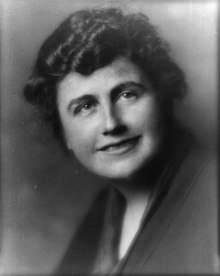My Memoir
Critics generally considered the book to be "delightful" as a "collection of episodes,” but especially those writing at publication predicted it would be of little historical value except for its account of Woodrow Wilson's stroke and last days in office.
[9] A 1939 review published in The Vancouver Sun by David Robertson noted that Woodrow was the "central figure" in the memoir and felt that it "reveals the man" in a book of "rare delicacy".
Robertson concluded that while the book would likely never be "accepted as historical documents are", it was "a fascinating and revealing love story" and "at its highest, it is valuable addition to one's knowledge" of Woodrow Wilson.
"[6] That said, in the late 20th and early 21st centuries, historians used My Memoir to examine topics like race in the Progressive Era[13] and the policy influence of First Ladies,[14] and to reevaluate the role of Wilson as a powerful political player in her own right.
[16] Slagell and Zaeske conclude that although the book has "numerous inaccuracies due to the fact it was written two decades after the events it described and was highly romanticized, it remains the most revealing source we have about the closing days of the Wilson administration."
[5] Phyllis Lee Levin attributes to Edith and her memoir the creation of a public opinion of that "mythologiz[ed] her husband's goals and reputation as ennobled prophet, warrior, and statesman.
